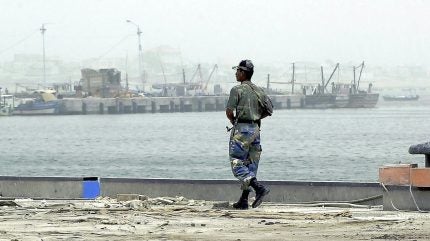
An attack by armed militants from the Baloch Liberation Army (BLA) on Gwadar Port yesterday (20 March) was thwarted by security officials, who port authorities and Balochistan’s Chief Minister say killed eight “terrorists”.
Gwadar Port, located in Pakistan’s southwestern Balochistan province, is strategic for shipping routes crossing East and South Asia to the Middle East via the Arabian Sea, Persian Gulf and Strait of Hormuz.
It is also a stop-off between the Indian Ocean and the Mediterranean before the embattled Red Sea and Suez Canal, subject to ongoing attacks by Yemen’s Houthi militia.
The port’s shipping activity has not been affected, according to Passand Khan Buledi, chairman of Gwadar Port Authority.
The attacks mainly targeted “a complex where employees of Gwadar Port live”, Buldei told Ship Technology, adding: “There has been no commercial impact on Gwadar Port.”
China’s ‘String of Pearls’
Buledi’s assurances will have been welcomed by Chinese investors and government figures.
In 2013, China acquired control of Pakistan’s only deep-sea port as part of Beijing’s $65bn total investment in the so-called China-Pakistan Economic Corridor (CPEC).
Gwadar Port is run by China Overseas Ports Holding Company Pakistan, a key agent in President Xi Jinping’s flagship Belt and Road Initiative (BRI), a transcontinental infrastructure project linking China with all corners of Asia, the Middle East, Europe, Africa and Russia by rail and ship.
The port reached a milestone last May when the Hangeng Trading Company completed the first direct export from Gwadar to China, shipping five containers of pharmaceutical raw materials to Tianjin Port.
Pakistan’s newly elected Prime Minister Shehbaz Sharif has said he is keen to pursue the second phase of the CPEC.
Minimal progress was made in Sharif’s first tenure amid political unrest across Pakistan during the arrest of opposition candidate and former Prime Minister Imran Khan.
India remains distrustful.
India-Pakistan relations are fraught, but New Delhi is far more concerned by the threat of Beijing to the east, expressing concern over China encircling it in a ‘String of Pearls’, or ports, naval bases and infrastructure projects.
China’s control and expansion of Gwadar Port threatens India’s naval security in the Arabian Sea and Gulf of Oman, where a sizeable amount of its energy and oil imports pass through.
On the flipside, Jinping will be hoping for a period of profitable calm in Pakistan, even if it is not forthcoming.
BLA attacks aside, Islamabad has engaged in cross-border attacks with Afghanistan earlier this week and a tit-for-tat of missiles with Iran in January which left two children dead in Balochistan.
Balochistan – a symbol of Pakistan’s mineral riches
A vast region which spans Pakistan, Iran and Afghanistan, Balochistan has seen low-intensity insurgency for decades.
Shortly after the attack on Gwadar Port began, BLA spokesperson Jeeyand Baloch released a statement claiming the militia’s Majeed Brigade had targeted the ISI and MI, Pakistani intelligence forces.
The BLA unit reportedly used M16A4 rifles (US weapons seen in Afghanistan and Iraq), AKM rifles with GP-25 UBGL, Chinese Type 69 RPG Launcher and Type 56-1 rifles.

In January, ten people were killed in an overnight attack by the BLA which targeted military installations with guns and rockets in the city of Mach, 65km south of Balochistan’s capital, Quetta.
In Pakistan, Baloch nationalists demand greater political independence and a bigger share of the province’s resources, which foreign investors frequently siphon away.
For instance, Balochistan is home to one of the largest undeveloped copper-gold reserves in the world; Reko Diq, which boasts 12.3 million tonnes of copper and 20.9 million ounces of gold.
Reko Diq is 50% owned by Canadian mining firm Barrick, 25% owned by three federal state-owned enterprises, and 25% owned by the Province of Balochistan.
Wider Pakistan also holds a remarkably diverse geological landscape, with immense reserves of bauxite, coal, iron ore and chromite, as well as copper and gold.
While Pakistan’s government continues to encourage foreign direct investment (FDI) from companies in shipping, mining and other sectors, this BLA attack will have prompted concerns over future disruption.



